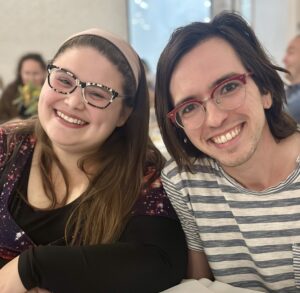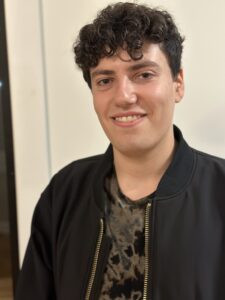By Andrew Adler
Community Editor
Let’s say you’re an older teenager or a young adult, and you’re looking for the best place to get news about the ongoing conflict in Israel. Where do you turn to first? Your friends? Social media? Maybe your parents?
It’s easy to get overwhelmed. At any given moment on any given day since Hamas attacked Israel on October 7, there are hundreds – if not thousands – of associated reports, commentary, videos, podcasts —the dizzying plethora of contemporary communications. The question then becomes: how do you parse what you’re consuming? How do you know which sources of information you can trust, and which should be regarded with considerable skepticism?
“I would say the majority of where I get my news from is related to Jewish identity,” says 24-year-old Lauren Schipper, who works in the administrative offices of Keneseth Israel Congregation. “So I have a lot of friends who live in Israel, or the Jerusalem Post or the Times of Israel, or something along those lines. I try to stay away from CNN or other places like that, because they have a little bit of bias, especially when it comes to reporting things before we have the facts. I usually stick with Israeli or other Middle Eastern sources that have more boots on the ground.”
Social media is often the driving dynamic in how news about the war is consumed. Instagram, TikTok, X (formerly known as Twitter) and their close online cousins — optimized for mobile consumption on a smart phone – prospect of quick and easy information digestion that may or may not provide an informed view of what is actually going on.
For every teenager or twentysomething who takes the time to read through a Thomas Friedman column in the New York Times, there are likely dozens and dozens of others who opt instead for presentations that may be insufficiently balanced, or truncated to the point of distortion. It is challenging to obtain sufficient perspective and depth on issues as complex as those raised by the war against Hamas. And since for many young people the most precious commodity is time (or their lack of it), the temptation to consume information in small packages is as compelling as it is constant.
Another issue is that social media platforms structure their feeds according to particular algorithms, which are based on who users engage with the most. Instead of presenting a variety of viewpoints a generous sampling of sources, a given platform can devolve into a kind of echo chamber, encouraging users to hew closely to existing beliefs – what is often called “confirmation bias.”
Having said that, some users may simply prefer such implicitly curated content, especially as it can shield them from content they may find irrelevant or offensive. Any perusal of X, for example, reveals abundant, deeply repugnant anti-Semitism. It can be the same on platforms that appeal to younger users, typified by Instagram and TikTok. Little wonder, then, that young people would just assume avoid being bombarded with that kind of ugly, potentially triggering material.
“Social media has been kind of a terror hole,” laments Ken Schuck. A 29-year-old who paints and teaches dyslexic children how to read, he occasionally peruses Reddit, but otherwise prefers sources like Tablet magazine and the Shalom Hartman Institute, a leading center of Jewish thought.
Indeed, “fair and balanced” can be a decidedly relative ideal. Schipper freely acknowledges that she has no desire to seek out viewpoints she considers patently outrageous. Few people, not the least her, would regard Hamas’s slaughtering of civilians somehow worthy of occupying one boundary in a civilized debate “I guess my opinion of a balanced view would mean giving each side equal weight,” she says, “and I don’t really think that’s appropriate here.”
Similarly, “we can’t escape the fact that whatever comes out of Gaza is filtered through the lens of Hamas,” Schipper says. “So if you’re giving equal weight to both sources, you’re giving a terrorist group the same weight as an actual government institution.”
Still, it’s not impossible to identify social media sources that present themselves as exemplars of objectivity. “I follow an account on Instagram called RocaNews (@ridethe news),” says Eric Cohen, 23, an Environmental Studies major at Bellarmine University. “It’s a nonpartisan, independently based news organization started by a bunch of young guys. I’ve been following them for about three or four years now. I like him because they don’t pick a side.”
All too often, social media posts about the war tend to be absolutist in one way or another. “It’s dangerous to get into a mindset where I’m right/you’re wrong,” Cohen says. “You get into a cycle where you find a new source that reinforces your belief system, so you just keep falling over and over again – and that’s how your brain gets skewed in the wrong direction.”
As for TikTok, which is largely controlled by the Chinese government, Cohen would just assume look elsewhere. “I don’t like where it comes from, and I don’t like the kind of culture it creates. I really try to stay away from it.”
It’s not all gloom and doom regarding TikTok, however. “I think there were lots of independent journalists that use TikTok as their platform to share information,” says Abigail Goldberg, director of teen engagement at the Jewish Federation of Louisville. “Whether it’s first-hand experiences, whether they’re congresspeople or representatives in government for using that platform to share their experiences and their insight. I know there are civilians that are using TikTok as a platform for activism. So it’s not just 22-second soundbites, because there is a constant stream of communication through these apps.”
Significantly, Goldberg points out, teens and young adults active on the platform might well absorb more information about a given subject in video format compared to a text version “TikTok allows three, five and 10 minute videos,” she says. “If someone’s explaining not just the just, but the high points of an article, you can get just as much information in that three-minute video as you can reading an article – and a lot of students nowadays are opting to scroll on TikTok, so that’s what they’re reading.”
Goldberg adds: “NBC, CNN – I see Anderson Cooper pop up on my TikTok feed quite often. Mike Huckabee also popped up in news clips, so you see the right and the left. But it depends. Your algorithm has a huge play about what you see online. I choose to post a lot in support of Israel. So my Instagram algorithm is going to show me many things and many different activist bloggers and journalists, people in general who are also pro-Israel.”
Truth can be an elusive commodity. “There is rarely something I feel I can actually trust on social media,” says Violeta Higuera, a 17-year-old senior at Kentucky Country Day. Instead, “I’ve been asking people like my friends who live in Israel how it’s going.”
Recently, she attended a meeting led by Matt Golden – director of the Federation’s Jewish Community Relations Council — who spoke about the history of Israel through the centuries, insight into what’s happening now, and crucially, “how to respond to things people say to us” that may be sharply provocative, Higuera says. She mentioned Rabbi David Ariel-Joel of The Temple as another of her trusted sources.
“A lot of the time it’s like, ‘what do I believe?’ I see all these graphic things on Instagram – are they true or not? So what Rabbi said to us was really helpful.”
This past summer Higuera visited Israel, an experience that provided valuable context she can draw on as the Hamas war unfolds. “Before I went to Israel, I didn’t feel like I had the right to have an opinion,” she says. “I would get my news from Instagram, but when I went to Israel, I had my own experiences, and I met Israeli friends.”
Try as she does to stay above the fray of churning information and misinformation, sometimes Higuera can’t avoid being drawn into unwanted online confrontation — references to “from the river to the sea” on Instagram, for example. Elsewhere, “I had to block this girl because she was posting the most graphic things. It would be seven in the morning, I’d be scrolling through my friends’ Instagram stories, and there would be the bloodiest things ever.”
Another poster questioned whether Israel was fully justified in how it is responding to Hamas. “He made it seem like it was a bad thing,” she says. “I realized that a lot of people just aren’t educated on what it actually means.”
As with other users of social media, content in one’s feed “depends on what you click on to like,” Higuera says. Sometimes “you get the fake ones, and you have to pick them out. I haven’t gotten to tick-tock because I know if I look at it once, my whole feed is going to be filled with what I don’t want. It’s the same with Instagram. If I see something interesting on someone’s story, I’ll click on them. But I also get emails from Route One, the (Trager Family) JCC and others like BBYO — they put out a weekly update.”
It may simply be that the unprecedented nature of Israel’s war challenge makes online collisions inevitable.
“When I post my opinion online,” Goldberg says, “I know that I’m opening the door for other people to either agree or disagree, to start a conversation or start an argument with me. And I also know that when people post their opinions on Facebook, you have to know the audience you’re connected to.
“I read a lot of comments on Instagram posts,” she says. “And half the time I choose not to engage. If you see anti-Semitism online, absolutely say something to stop that. But if someone is just posting their blatant opinion saying, ‘I support Palestine because I don’t support the death of innocent children,’ that’s fine. That’s your opinion. You’re allowed to post that. But if I see something online that says, ‘Death to all Jews; Death to the State of Israel,’ I’m absolutely going to engage with that. I feel it’s important as a Jewish American, someone who’s proud to be Jewish, if I see hate online, I’m going to try to stop it, or at least make my voice known.
“But often, you’re not going to change their opinions by engaging in conversation,” Goldberg acknowledges. “So you also have to know where the line is. Can I engage them in conversation, or am I going to start an argument and they’re never going to change their minds.”







